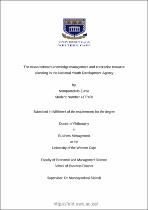| dc.contributor.advisor | Sibindi, Ntandoyenkosi | |
| dc.contributor.author | Zuma, Nompumelelo | |
| dc.date.accessioned | 2023-05-15T07:06:18Z | |
| dc.date.available | 2023-05-15T07:06:18Z | |
| dc.date.issued | 2022 | |
| dc.identifier.uri | http://hdl.handle.net/11394/9944 | |
| dc.description | Philosophiae Doctor - PhD | en_US |
| dc.description.abstract | Organisations are investing significant capital in information systems that facilitate remote work and cloud networking. The preferred system is one that provides an organisation with all the tools required for information resource management. Of the available systems, the enterprise resource planning (ERP) system is the most commonly implemented system due to its advanced features that surpass those of other systems in the market. An organisation must leverage its rich tapestry of knowledge to better implement the ERP. Knowledge management (KM) is the backbone of modern technology adoption, providing managers with the information necessary to customise the ERP to meet organisational needs. Public sector organisations in South Africa are striving to implement ERP to provide a comprehensive solution to information management problems. Despite its advantages, the ERP system takes an average of four years to implement, depending on an organisation’s size, and requires millions of Rands for customisation and add-ons. | en_US |
| dc.language.iso | en | en_US |
| dc.publisher | University of the Western Cape | en_US |
| dc.subject | Public sector | en_US |
| dc.subject | Knowledge management | en_US |
| dc.subject | Enterprise planning | en_US |
| dc.subject | Business | en_US |
| dc.subject | National Youth Development Agency | en_US |
| dc.title | The nexus between knowledge management and enterprise resource planning in the National Youth Development Agency | en_US |
| dc.rights.holder | University of the Western Cape | en_US |

